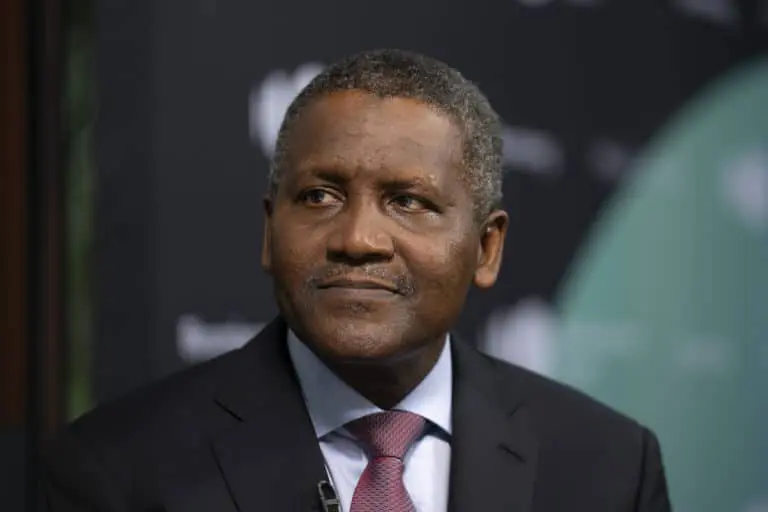Daud Olatunji
Billionaire industrialist Aliko Dangote has witnessed a remarkable surge in his wealth, which has nearly doubled to an estimated $23.9 billion, according to the latest data from Forbes.
The Nigerian entrepreneur has now reclaimed a spot among the top 100 wealthiest individuals globally, ranked 86th in the world.
PLATFORM TIMES reports that this marks a significant leap from his previous ranking in 2024, when he was listed as the 144th richest person with a net worth of $13.4 billion.
Dangote’s financial success is largely attributed to his 92.3 percent ownership stake in the Dangote Petroleum Refinery & Petrochemicals, a project that has redefined the energy landscape in Africa.
The 67-year-old tycoon, once again a prominent figure in the elite ranks of the world’s wealthiest, last held a top 100 position in 2018.
His current standing places him far ahead of other notable African business magnates, including South Africa’s Johann Rupert, ranked 161st globally with a wealth of $14.4 billion, and Nigerian telecom mogul Mike Adenuga, who is in 481st place with a net worth of $6.8 billion.
The catalyst for Dangote’s wealth surge is his ownership of the Dangote Refinery, which stands as the largest petroleum refinery in Africa and one of the largest in the world.
After 11 years of relentless work and a monumental $23 billion investment, the refinery began operations last year.
Situated on a sprawling 6,200-acre site in the Lekki Free Zone, the refinery is poised to process an impressive 650,000 barrels of oil per day at full capacity. When fully operational, it will rank as the seventh-largest refinery globally.
Alongside the refinery, Dangote has also developed a petrochemical complex that produces 3 million metric tons of urea annually, cementing his position as the largest producer of fertiliser in Africa.
This extensive infrastructure is set to have far-reaching consequences not just in Nigeria but across global energy markets.
According to energy intelligence firm Vortexa, imports of petroleum into Nigeria are projected to reach an eight-year low, a development that could challenge European refiners who have traditionally supplied the country.
In addition, Nigeria has now become a net exporter of key products such as jet fuel, naphtha, and fuel oil, reports S&P Global.
Dangote’s vision extends beyond the refinery itself.
He sees the project as a key component in his broader ambition to transform Nigeria from a major crude oil producer into a leader in refined petroleum products.
In doing so, he aims to position Nigeria as a competitor to European refineries, ensuring a steady supply of gasoline for the local market.
In an interview with Forbes, Dangote shared his aspirations for Africa, underscoring the need for self-reliance in industrialisation.
“I want to provide a blueprint for industrialisation across Africa,” Dangote explained. “We have to build our nation by ourselves. We have to build our continent by ourselves, not [rely on] foreign investment.”
He expressed his frustration at Africa’s historical dependence on foreign markets, saying that the continent has long been “a mere dumping ground for finished products.”
The Dangote Refinery, he believes, represents “a pivotal step in ensuring that Africa can refine its own crude oil, thereby creating wealth and prosperity for its vast population.”
Describing the project as the greatest risk of his career, Dangote candidly acknowledged the stakes involved in such a monumental venture.
“It was the biggest risk of my life,” he said. “If this didn’t work, I was dead.” Despite the inherent risks, Dangote’s determination and vision have propelled the project to success, with his wealth and reputation growing alongside it.
Zainab Usman, director of the Africa Programme at the Carnegie Endowment for International Peace, emphasized the significance of Dangote’s achievements, noting that many Nigerians view him as a symbol of industrial progress.
“He is seen in most parts of Nigeria as a hero. He is seen as a real industrialist who builds things,” Usman commented.
Chika Ezeanya, a professor of African studies at the Soka University of America, echoed this sentiment, pointing out that Dangote’s approach addresses the growing needs of the African consumer.
“I think he’s believed staunchly in the fact that Nigerians need products that he has to offer,” Ezeanya remarked. “Governments can come and go, policies can be changed, but the needs of the Nigerian consumer will only grow and expand.”
Do you want to share a story with us? Do you want to advertise with us? Do you need publicity for a product, service, or event? Contact us on WhatsApp +2348183319097 Email: platformtimes@gmail.com
We are committed to impactful investigative journalism for human interest and social justice. Your donation will help us tell more stories. Kindly donate any amount HERE




